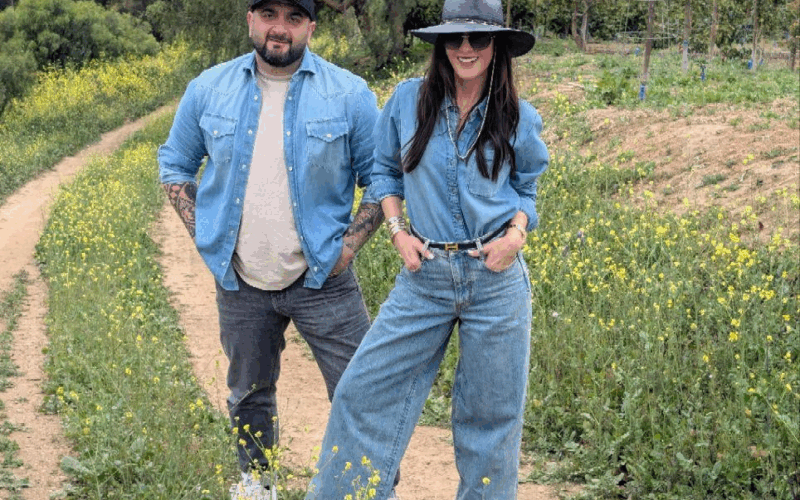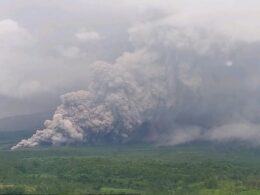Content oversight provided by Studio 1847
In an era where California agriculture is increasingly defined by water shortages, bankruptcies and consolidation, entrepreneurs Edvin Ovasapyan and Shery Zarnegin are proving that there’s still room for major innovation — and profit — in the dirt.
As the cofounder and operator of One Tree Hill Farms, Ovasapyan isn’t just restoring neglected farmland along the Central Coast — he’s executing a scalable business model that blends regenerative agriculture, product diversification and vertical branding. Together with creative director and brand strategist Zarnegin, he’s building more than a farm: he’s launching a high-growth venture with the potential to redefine California’s ag sector for a post-industrial economy.
From urban grit to coastal grit: The path of a practical visionary
Before turning to farming, Ovasapyan built a reputation in Southern California’s real estate and business development world as a pragmatic problem-solver with a high tolerance for risk. With a background in operations and private investment, Ovasapyan saw farmland not as a relic of the past but as an undervalued asset class — particularly in regions like the Central Coast where ocean-cooled microclimates remain underutilized.
In 2017, he and Zarnegin structured a buyout of a declining avocado orchard in Santa Barbara County. It had been battered by drought, underinvestment and absentee ownership. But where others saw liability, Ovasapyan and Zarnegin saw opportunity. “Everyone told me I was wasting my time,” Ovasapyan recalls. “But we were not just buying land — we were buying time, terrain and optionality.”
Building a high-performance agricultural asset
From the start, Ovasapyan approached the farm like a turnaround business. He stabilized avocado production, introduced Geisha coffee, and invested in regenerative farming practices to increase long-term soil value and reduce chemical input costs. The business model emphasized dual-season revenue: coffee harvested in spring and avocados in fall, stabilizing cash flow and insulating against price volatility.
In its current form, One Tree Hill Farms:
-
Produces 100,000 pounds of avocados and 5,000 pounds of specialty coffee per year;
-
Operates on renewable energy and closed-loop irrigation systems;
-
Has developed a proprietary cascara product, derived from coffee cherries;
-
Maintains low overhead by maximizing vertical integration across farming, processing and packaging.
“We don’t think of it as a farm,” says Ovasapyan. “We think of it as an agricultural brand platform — with land as our operating foundation.”
Strategic synergies: Avocados and coffee as a revenue pairing
One of Ovasapyan’s earliest business innovations was pairing avocado and coffee cultivation. Unlike many growers who struggle with monocrop vulnerability, Ovasapyan designed a dual-commodity system that maximizes acreage efficiency and creates long-term land value.
The benefits include:
-
Shared infrastructure: Coffee trees thrive under the avocado canopy, reducing irrigation and energy costs.
-
Ecosystem resilience: Crop diversity improves pollination, pest control and soil microbiota.
-
Split cash flow cycles: Providing two harvests at different times of the year reduces financial strain.
Few farms in the U.S. grow both crops at commercial scale — which Ovasapyan sees as a competitive moat. “If you can make dual cropping work in California, you’re not just farming — you’re manufacturing risk-adjusted yield.”
The brand factor: From commodity to lifestyle product
While Ovasapyan runs operations, Zarnegin focuses on the farm’s external identity. She’s helped build One Tree Hill Farms into a consumer-facing brand, complete with origin stories, packaging innovation and product extensions like cascara infusions, which are now trending in wellness and specialty food circles.
Together, they’re exploring direct-to-consumer channels, agritourism experiences, and even a line of limited-edition farm goods for chefs and retailers. “We’re not in the volume game,” says Zarnegin. “We’re in the value creation business — where taste, story and sustainability intersect.”
Restoring land, rebuilding value
At its core, One Tree Hill Farms is a land restoration project. The terrain Ovasapyan acquired had been logged, over-farmed and left in disrepair. But with regenerative techniques such as deep-rooted crop rotation, composting systems and carbon-retentive soil strategies, the farm is now a showcase for what’s possible when entrepreneurship meets environmental intelligence.
And it’s not just about sustainability. It’s about re-capitalizing distressed agricultural real estate through a model that prioritizes resilience over scale, and diversification over extraction.
Scaling the model: 300,000 trees and beyond
With initial success under his belt, Ovasapyan is planning a major expansion, aiming to plant 300,000 avocado trees and 300,000 coffee trees over the next decade across California’s underutilized coastal foothills. He’s currently scouting additional properties and building a partner network for off-site roasting, bottling and distribution.
His goal isn’t to become the next big industrial grower but to replicate the One Tree Hill model in other microclimates, leveraging technology, modular farm systems and strong design to create a franchiseable blueprint for regenerative farming.
Entrepreneurship in agriculture: A new generation emerges
For Ovasapyan, the future of farming doesn’t belong to large corporations or nostalgic homesteaders; it belongs to agile, informed operators who think like founders.
“Land is only one part of the equation,” he explains. “You also need a brand, a supply chain and the ability to adapt fast. Farming is hard, but it doesn’t have to be dumb.”
With One Tree Hill Farms, Ovasapyan hopes to show what’s possible when you combine venture-style strategy with ecological thinking — and prove that even in a drought-stricken, overregulated state like California, there’s still a future in the soil.
To follow One Tree Hill Farms or learn more about regenerative agriculture investment models, visit OneTreeHillFarms.com or follow Edvin Ovasapyan and Shery Zarnegin on LinkedIn.
Originally Published:








